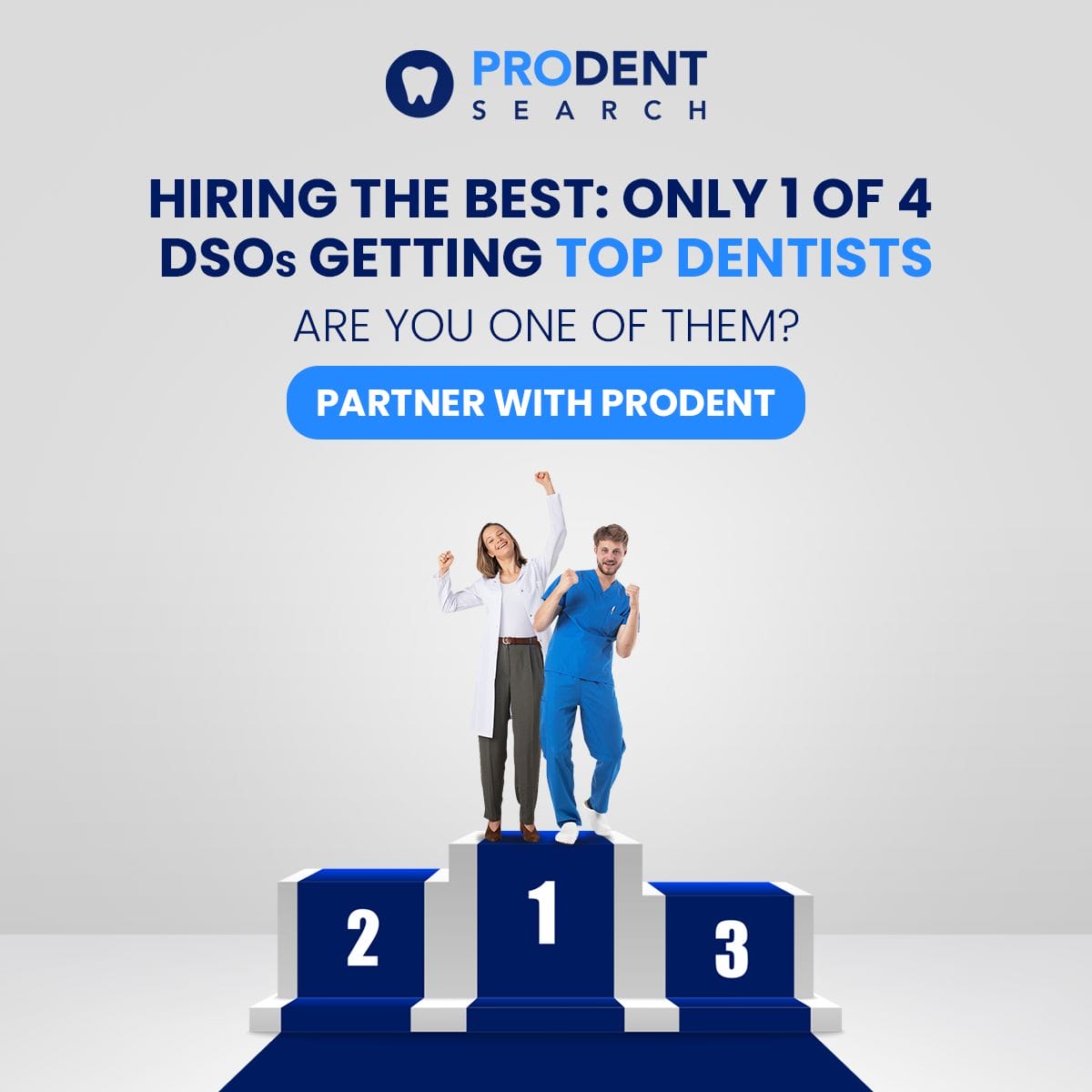Last updated on September 21st, 2022
For most dental practices, staffing shortages were already a thing before the Covid pandemic, and they still are. For DSOs hoping to grow patient visits and revenues, maintaining an adequate inflow of qualified practitioners has become more and more difficult.
While ADA research shows recent increases in the number of dental graduates, that’s balanced against increasing retirements of older practitioners. The net inflow of new practitioners is growing very slowly — projected at less than 2,000 per year until 2025, then increasing slightly in the years following. There isn’t a surplus of practitioners rattling around the market.
That’s one of the primary reasons DSOs put so much effort into recruiting at collegiate dental programs. Getting bright, young, ambitious grads before they’ve put down roots in a local practice is an effective way to bolster staff. The ADA research shows the number of graduates increasing from around 7,300 annually now to about 7,800 between 2030 and 2035. These new dentists who don’t yet have a practice to call home need experience and training, but they can tend chairs as they develop and expand their skills.
But are these graduates a good bet for DSOs?
Newly minted practitioners are qualitatively different from those coming out of school a decade ago. They have different attitudes, different values and different expectations that may make them a challenging fit for the DSO environment.
In other ways, however, they are perfect candidates.
While the hope and expectation of earlier generations was to own their own practice or become a partner in a successful local practice, today’s graduates see that hope as a faint glimmer. Ballooning student debt means starting a practice is, well, impractical. According to the American Dental Education Association, the average 2020 dental school graduate had just over $300,000 in student loans. Repayments of $3,500 a month for 10 years would come close to satisfying the debt, but that’s $42,000 of after-tax income each year accounted for. The debt makes it hard to access capital. It means they need substantial income right away. And it’s a cloud looming over their ambitions. What if they do manage to start a practice? And what if they have some lean months? Will they still be able to pay down their student loans and keep the lights on?
Remember, today’s graduates lived through the 2007 economic meltdown. They have seen things go sour fast.
The need for income and economic uncertainty are strong arguments for employment by a large, mature and stable organization like a DSO.
While some observers have criticized recent college graduates for not being dedicated to their careers, or not being diligent and ambitious enough, the events that shaped their lives have made them realists. They’re less willing to trade current happiness for future fulfillment that they see as uncertain.
The realization that the future is uncertain is one of the underlying factors in the so-called Great Resignation, as millions of workers reassessed their lives and careers, with many opting to drop out, change careers or become solo entrepreneurs.
These same concerns are felt even more keenly by women.
Women now make up 51% of dental school graduates, and many are looking for a trajectory that offers a better work/life balance than would be afforded by partnering in a small practice or starting their own. A larger organization that can offer flexible hours and less after-work stress is very attractive, especially for women intent on starting a family.
For those who are dedicated, ambitious and still want to devote themselves to achieving career goals, a DSO has other things to offer: Valuable experience, continuing education and mentorship. Most DSOs encourage their associates to bulk up on CE credits. They often have older/more experienced practitioners who are designated to mentor younger colleagues. Their advice goes beyond treatments and procedures, as their life experience helps them guide newer practitioners through career decisions.
Mobility — both career and geographic — is another argument DSOs use to persuade recent graduates. A solo dentist with a bank loan, equipment mortgages and a long-term office lease is not mobile in any sense of the word. Large, geographically diverse organizations may offer the opportunity for their practitioners to move between offices in different regions. And given that a DSO may have many practitioners, the opportunity to morph from general dentistry into a specialty while staying in the same organization is a reality.
In all, if the DSO is adept at integrating practitioners with slightly different attitudes, new graduates can be a good bet. They can staff chairs and create a deep bench of future specialists. Just don’t bet that all of them will stay long enough to cash in their retirement chips with you.
Making sure your organization is getting the best, the ones whose skills and temperament will make them valuable players right away, your recruiting and selection process needs to be top notch. A professional recruiter like ProDent can make sure that the candidates to whom you extend offers are the right ones: The ones who are going to stick and make a difference to your bottom line. In the case of ProDent, their deep database of available talent and years of experience in placing dental professionals give DSOs the best shot at hiring the best.
While there are generational attitude challenges with some recent graduates, a solid process will lead you to the future stars. And DSOs have enticements that can go a long way to securing them.
Please visit our blog section for further insights.
- The 5 Phases of The Dental Career Path - January 4, 2024
- 7 of the Highest-Paid Dental Specialties in 2024 - December 22, 2023
- How to Reduce Dental Fears: 7 Ways to Increase Patient Comfort, Attendance, and Retention - December 15, 2023
Related posts:
Looking To Hire Top Dental Talent?
Dentists, Find Your Next Dream Job Here.


